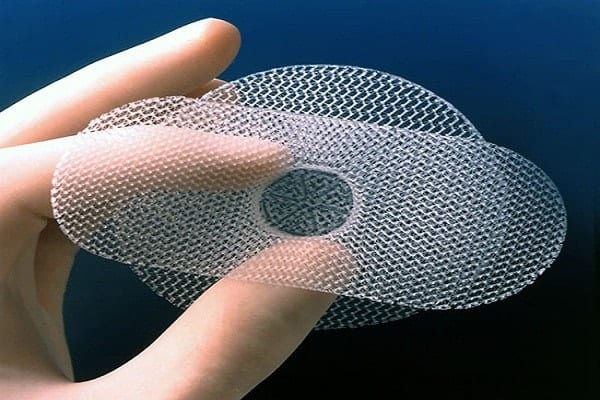
The number of hernia mesh lawsuits continues to mount, as the complication rate likely exceeds 30 percent in many areas.
Many patients were told that the serious complication rate was less than 5 percent. The misinformation from Bard, Johnson & Johnson, and other hernia mesh manufacturers prompted many people to undergo risky hernia mesh implantation surgery. This procedure is especially delicate because the Food and Durg Administration approved these devices under the controversial 501(k) expedited approval track.
An estimated 170,000 patients are at risk for serious hernia mesh side effects.
Hernia Mesh Uses
The hernia mesh is a classic example of a cure that is worse than the disease. Surgeons often implant meshes, which resemble very small window screens, after abdominal surgery on women. Some doctors also implant surgical meshes, which are also called hernia meshes, into women who have just given birth.
The mesh prevents Pelvic Organ Prolapse. POP prevents internal organs from sagging and constricting the bladder until the abdominal muscles recover. SUI (stress urinary incontinence) is one of the main symptoms. Anything which places additional pressure on the bladder may cause unintentional urination. Some of these things include:
- Sneezing,
- Coughing,
- Laughing,
- Lifting a heavy object,
- Exiting a car, or
- Having sexual intercourse.
These things are embarrassing and may cause isolation. However, they are obviously not life-threatening.
Since they are in a delicate area of the body, surgical meshes must be thin and unobtrusive. Unfortunately, they are often a bit too thin, and that’s where personal injury lawyers in Brainerd, MN come into the picture.
Some Hernia Mesh Complications
Many times, the serious complications associated with medical devices are extremely rare. But that’s not the case with the hernia mesh. Some of the most serious side-effects and complications are also some of the most common side-effects and complications.
Over time, the mesh material melts into body tissues, a process known as adhesion. Over-optimistic manufacturers predicted that doctors would remove the mesh before adhesion set it. But the process begins much more quickly than manufacturers anticipated. So, many times, the patient’s abdominal muscles are not strong enough to support internal organs before adhesion sets in.
Severe chronic pain, which could indicate almost anything, is the only symptom of adhesion. By the time the patient develops a bowel obstruction, which is the next step, adhesion could be fatal.
Sometimes, rather than obstructing the bowel, the mesh material perforates the bowel. Perforation could cause sepsis, which is a blood infection, or peritonitis, which is bacteria and fecal matter in the abdominal cavity. These infections may be dormant for many years after they develop.
Finally, many meshes either tear or migrate. These things are especially common if the patient is rather active. Migration or detachment could cause:
- Abscesses,
- Bowel obstruction,
- Adhesions, and
- Bowel perforation.
These side-effects are especially common when surgeons implant meshes after minimally-invasive hernia surgery, probably because these patients are more active during recovery.
In one study, roughly a third of the people who received a hernia mesh required subsequent abdominal surgery. Emergency surgery was not uncommon.
Personal Injury Lawyers in Brainerd, MN and Damage Claims
Design defects usually cause these complications. Manufacturers have a duty to design products that are safe and effective, especially with regard to medical devices. These products should perform as advertised and not cause serious side effects. If a product fails to meet this standard and causes injury, the manufacturer may be strictly liable for damages.
Causation is the most complex part of this process for personal injury lawyers in Brainerd, MN. But generally, hernia mesh product defect claims are easier for a jury to follow than some other claims, such as SSDI antidepressants. Typically, a jury can connect the dots from defective mesh to dangerous side-effects, with the help of a medical expert.
To ascertain expert credentials, Minnesota courts use the Frye-Mack standard. This standard is not as stringent as the one used in other states. So, personal injury lawyers in Brainerd, MN are better able to present such testimony to the jury.
Procedurally, Minnesota judges often assign hernia mesh and other defective medical device claims to Multi-District Litigation courts. The Federal Rules of Civil Procedure allow limited consolidation for pretrial purposes. MDL matters include hernia mesh, talcum powder, and other such actions which do not qualify for class-action status, but have enough in common to consider together, at least for pretrial purposes.
MDL conserves judicial resources and allows different personal injury lawyers in Brainers, MN to work together and settle cases quickly. If the matter does not settle out of court, it returns to its home jurisdiction for trial.
Connect with Experienced Attorneys
The hernia mesh is one of the riskiest medical devices ever to hit the market. For a free consultation with an experienced personal injury lawyer in Brainerd, MN, contact Carlson & Jones, P.A. We handle defective medical device claims on a nationwide basis.

